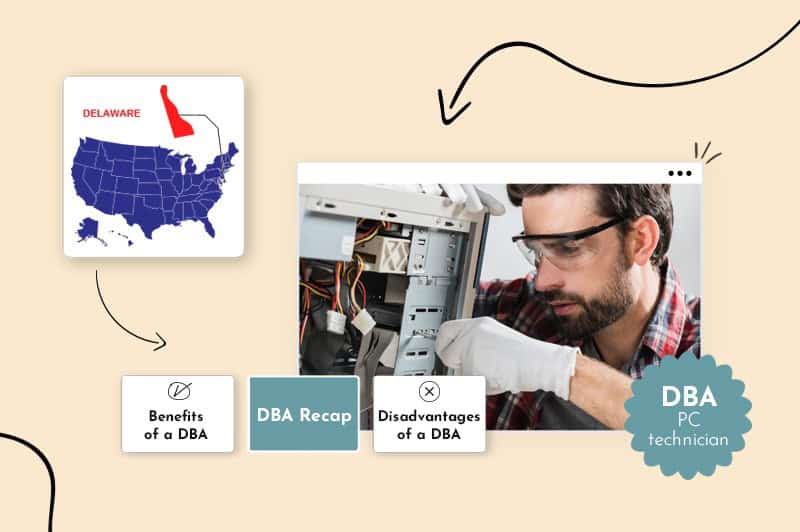A trade name, as Delaware DBAs are termed, allows your business to operate under a name other than its legal one. A different name may be advantageous for marketing purposes, operating several businesses together, maintaining privacy, or to simply avoid writing “LLC” after each instance of your business’ name. Having a DBA can suit you if you’ve recently learned how to form an LLC in Delaware or if you’re operating under a different business entity, such as a sole proprietorship.. If you’d like to operate under a name other than what your business files taxes as for any of these reasons, here’s how to set up a DBA in Delaware.
What is a DBA (“Doing Business As” name)?

A Delaware DBA is a trade name that your business can operate under for marketing purposes. It doesn’t replace your business name on official forms but can on almost everything else.
In Delaware, a doing business as name is referred to as a trade name. Other states call it a fictitious name or assumed business name.
Any type of business can register a Delaware trade name. Sole proprietorships, limited liability companies, partnerships, corporations, nonprofit organizations, and others all regularly use DBAs.
Benefits of a DBA
A DBA isn’t the only way that you can obtain a business name, as you can choose a name when filing a Certificate of Formation/Incorporation. Compared to the more involved filing of a new business entity, however, a DBA has several advantages:
- Sole proprietorships can register a DBA. You don’t have to create a formal business entity (e.g., LLC, corporation).
- No employer identification number (EIN) is needed to obtain a DBA. You don’t have to request an EIN if you’re a sole proprietor, or an LLC owner with no employees.
- Trade names aren’t required to have LLC, L.L.C., Corp. Inc., etc., as most business entities’ official names must.
Disadvantages of a DBA
That’s not to say a DBA is completely perfect. It has one major disadvantage when compared to filing for a new business entity.
Having a trade name affords your business and yourself no legal protections. This is just a fictitious name that your business can use, and not a corporate entity. The corporate veil that an LLC, corporation, or other business entity offers isn’t in place if you only register a DBA.
(Of course, you can file for both a DBA and an LLC or another entity. This will give you both legal protection and a trade name.)
Is having a DBA in Delaware a must?
No business in Delaware is required to have a DBA. Obtaining a trade name is optional, and whether your business should get one depends on your business strategy.
Filing for a DBA in Delaware

The most important detail when filing for a DBA in Delaware is, obviously, the name. There are a couple of naming details to check before you register your trade name.
Name requirements
- Delaware trade names can’t have a business entity designator (e.g., LLC, L.L.C., Inc.)
- “Bank” is only allowed if a state-approved bank, or if used in a different context (e.g. Bank It in Basketball)
- Words that are easily confused with government agencies can’t be used (e.g. USDA, NSA, Treasury)
- Words such as Association, Club, Foundation, Fund, Society, Institute, Union and Company are allowed if appropriate
- The chosen trade name must be distinguishable from all other business names used in Delaware
Begin with a Delaware assumed name search
Once you have a name that meets these requirements, you can confirm that it’s available by searching the Delaware Courts Trade, Business & Fictitious Names page.
Make sure the county selected is “all,” and use the search function to search your desired name. You can either use quotes to search exactly, or search without quotes and manually go through the alphabetical list.
You’ll have to modify your desired name if there’s a match. A couple of easy ways to modify business names are by including your name (e.g. Joe’s Pizza”) or a location e.g. “Kent County Heating & Cooling.” There are numerous other ways to creatively adjust names too.
Register your Delaware DBA
Delaware trade names are registered at the county level. You’ll have to file the DBA paperwork with the county clerk(s) where your business is located. All county clerks use the same form, and they all only accept forms that are mailed or dropped off.
File by mail (or in-person)
1. Complete the Form: Download the Registration of Trade, Business & Fictitious Name Certificate from the Delaware Courts. Complete the one-page form, which requests your business’ county, trade name, address, phone number, parent company (if applicable), owner/member names and addresses, date of formation, and nature. You’ll need a separate form for each county that you’re registering in. (This form is akin to what other states call a Certificate of Assumed or Fictitious Name.)
2. Get the Form Notarized: Bring the completed form to a public notary. The form actually doesn’t have to be signed, but it must be notarized by a Delaware public notary. Most county clerks have public notaries working if you’re going to drop the form off in person.
3. Submit the Form: Send the form to the appropriate county clerk. You can either mail the form or bring it in person to the following county clerk addresses:
- New Castle County: Leonard L. Williams Justice Center, Prothonotary, Superior Court, 500 North King Street, Suite 500, LL1, Wilmington, DE 19801 (Phone 302-255-0825)
- Kent County: Kent County Courthouse, Prothonotary, Superior Court, 38 The Green, Dover, DE, 19901 (Phone 302-735-1900)
- Sussex County: Sussex County Courthouse, Prothonotary, Superior Court, 1 The Circle, Suite 2, Georgetown, DE 19947 (Phone 302-855-7834)
4. Pay the Fee: A $25 registration fee is charged for each county that you register in. A check made out to the county clerk should be included if you mail the form. Most county clerks accept check, cash or card if you bring the form in person.
File online
Because DBA Delaware registrations are handled at the county level, there isn’t an option to register for DBAs online. You must either mail or drop off the form.
Consequences for operating a DBA without a registration
Should your business operate under a name other than its official name or trade name, you may face legal consequences. Violating Delaware’s trade name laws can result in fines of up to $100, jail time of up to 3 months, or a combination thereof. You also could face a lawsuit if the name use infringed on another business’ name,
Tax considerations
There are no tax considerations related to DBAs. Because these are only names and not business entities, registering a trade name in Delaware will have no impact on your state or federal taxes.
Conclusion
There you have it. Deciding on getting a DBA for your business, whether it’s an official, registered business entity or a sole-proprietorship could be a smart business move (depending on your strategy). Consider all the factors and decide if a DBA is the right choice for you!
